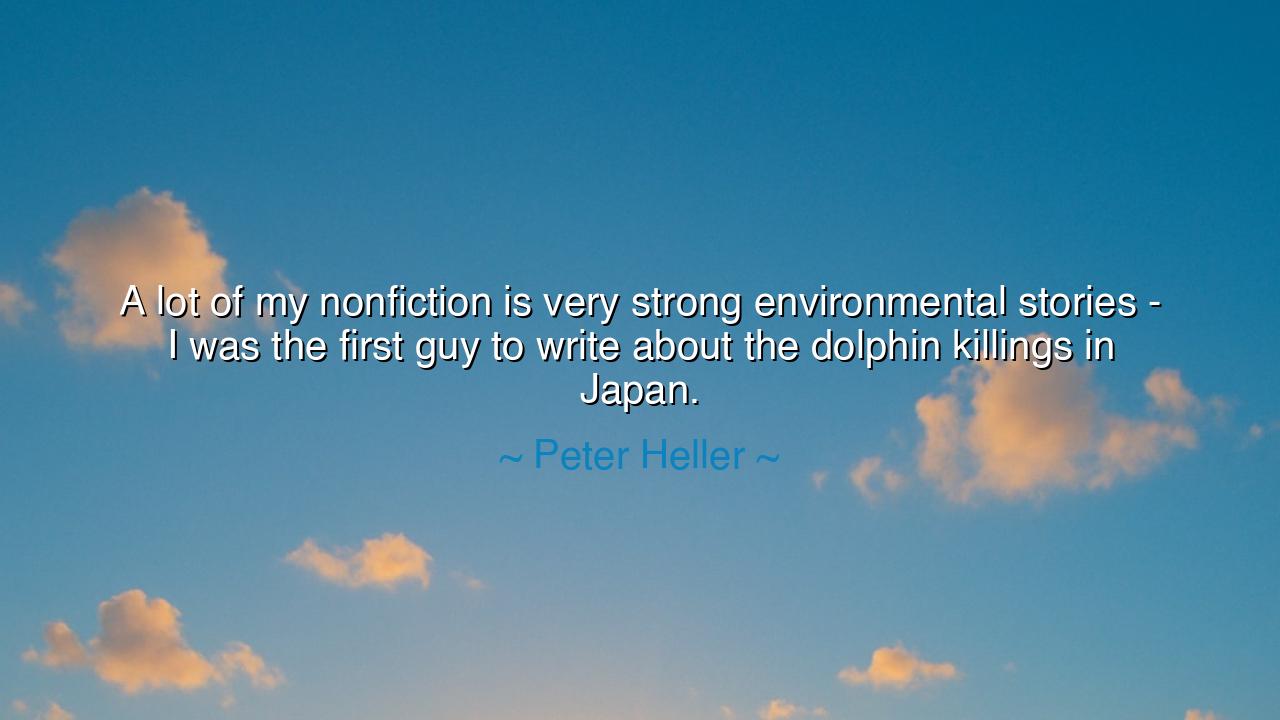
A lot of my nonfiction is very strong environmental stories - I
A lot of my nonfiction is very strong environmental stories - I was the first guy to write about the dolphin killings in Japan.






In a voice both fierce and compassionate, Peter Heller declared, “A lot of my nonfiction is very strong environmental stories – I was the first guy to write about the dolphin killings in Japan.” These words are not the boast of a man seeking fame, but the solemn remembrance of one who has borne witness to sorrow beneath the waves. Heller speaks not as a distant observer, but as a participant in the ancient struggle between human ambition and the natural world. His words reveal a truth that has echoed through centuries: that those who love the earth must sometimes raise their voices against its destruction, even when the world turns its face away.
The origin of this quote lies in Heller’s long journey as an adventurer, journalist, and novelist—one who sailed across oceans, climbed mountains, and entered the forgotten corners of the earth to tell stories others would not. When he wrote of the dolphin killings in Japan, he was not chasing controversy, but conscience. In the quiet coves where these creatures met their end, he saw more than tragedy; he saw a mirror of humanity’s fractured relationship with nature. His work became not only reportage, but a cry of the heart—a plea for empathy across species, for recognition of the sacred bond that unites all living things.
To understand his words, one must first grasp the ancient idea of stewardship, known to prophets, poets, and philosophers alike. The ancients believed that to rule over nature was not to exploit it, but to serve it with reverence. The shepherd was not master of his flock, but its protector. Yet as the ages turned, humanity forgot this balance. The seas became profit, the forests became lumber, and the creatures of the world became commodities. Heller’s writing seeks to awaken that forgotten covenant—to remind us that the earth, though generous, is not boundless, and that each act of harm ripples across the delicate web of life.
History, too, bears witness to those who spoke for the voiceless. In the nineteenth century, John Muir, the great wanderer of the American wilderness, saw his beloved Yosemite threatened by industrial greed. He stood before the powers of his time and said, “The mountains are calling, and I must go.” But Muir did not go to escape—he went to defend. Through his words, the world came to see that beauty has moral weight, and that the preservation of nature is not luxury but duty. Like Muir, Heller carries that same spirit—the courage to bear witness, even when the truth he writes may disturb the comfortable or anger the powerful.
The dolphins, in Heller’s story, are more than animals—they are symbols of innocence and intelligence, emissaries from the deep who remind us that creation itself is alive with consciousness. To kill them carelessly is not only a wound to nature, but to our own humanity. By bringing their plight to light, Heller joins the lineage of those who speak for those who cannot speak for themselves. His nonfiction becomes a form of moral resistance—a written act of preservation, a testimony that cruelty thrives in silence, and that truth is the first act of healing.
Yet beneath the pain of his words, there lies hope. For to tell a story of destruction is, paradoxically, an act of creation. By revealing what is broken, the writer calls forth the possibility of repair. Those who read such stories are stirred not only to grief, but to action. And it is through such awakening that change begins—not in governments or laws alone, but in the hearts of individuals who begin to see the world not as a resource, but as a relationship.
The lesson of Heller’s words, then, is clear and eternal: bear witness, and do not turn away. To love the earth is not a passive sentiment—it is a responsibility. Each of us, in our own measure, can become a steward, a voice, a defender. Whether we write, plant, teach, or simply live with greater awareness, we strengthen the chain of care that binds the living world together.
So remember this, children of the future: when you see injustice—whether against man or nature—speak. When you see suffering, act. The dolphins, the forests, the rivers—they are not separate from you; they are part of the same breath that animates your own life. As Peter Heller reminds us, stories have the power to heal when they are told with courage. Therefore, write, witness, and live as guardians of creation, that the world may remember not only what we took from it—but what we gave back.






AAdministratorAdministrator
Welcome, honored guests. Please leave a comment, we will respond soon